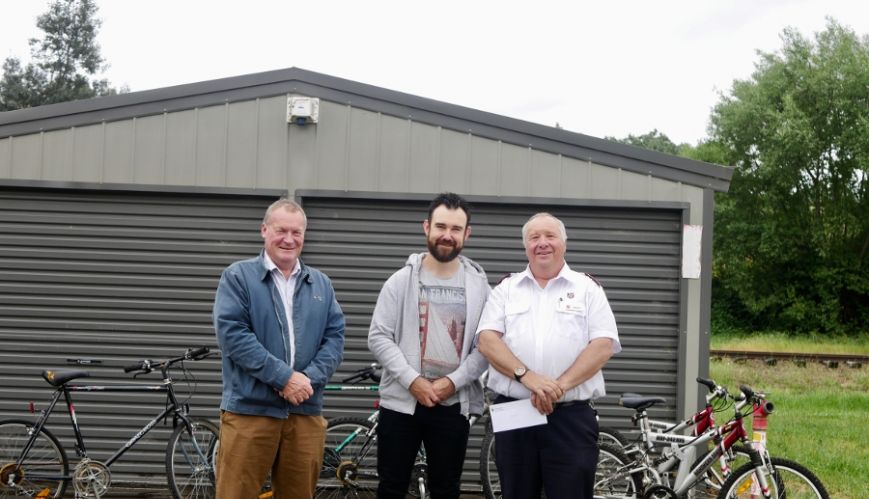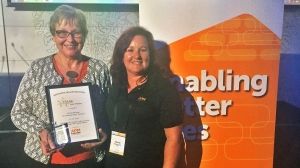Tasmania - holistic approach to service and mission

Tasmania - holistic approach to service and mission
15 June 2018
Steve Morgan (Communities for Children), Steve Nieuwhof (Derwent Valley Rotary Club) and Lieutenant Tim Size (Derwent Valley Corps Officer) head up the bike refurbishment program in Tasmania.
As part of the transition to a national territory, The Salvation Army in Australia now has six divisions. Throughout 2018, Others is profiling each of these divisions, this month highlighting the Tasmania Division.
Major John Friend, Tasmania Divisional Commander, says the state’s focus is to reflect the National Vision Statement.
“We want to do our part in transforming Australia one life at a time by transforming Tasmania one life at a time with the love of Jesus,” he says. “We are working towards this in several ways.
Through our social programs, we are continuing to develop the Doorways program, and are also active in supporting victims of domestic violence and those experiencing homelessness.
Next year we will be appointing area officers whose focus will be connecting corps and social programs, and we are really looking forward to that.
“Little things happening all over the place – like the story of Keith, who collected for the Red Shield Appeal because he knew The Salvation Army had a heart for social justice, just as he did. After collecting, he kept attending The Salvation Army and realised he needed spiritual transformation himself. He is now an active member of the Burnie Corps and has seen transformation in his own life.
“And Narelle, whom The Salvation Army assisted in the Dunalley bushfires in 2013 and now manages the Doorways program in Huonville and Cygnet. There are a number of these stories, transforming lives one at a time.
“Our isolation does give us opportunities. The Tasmania Division has been a pioneering and innovative division, willing to try new things and accept new challenges. For example, we have pockets of very low literacy rates in the state, in both adults and children.
"While this presents its own challenges, it has allowed us to pioneer some child literacy programs which are making a difference. We also have greater connection and influence with the State Government and can meet with ministers more easily than in bigger states.”
challenges for the division
“A challenge for most enterprises in Tasmania is finding the balance between size (small) and parochialism,” said Major Brad Watson, Divisional Public Relations Secretary.
“The Tasmanian people are proudly independent, which goes back to the colonial days where Van Diemen’s Land was the second settlement and quite distant from Sydney. The isolation of being on our islands adds to this. However, being small in number means that typically resources are scarce.”
In Tasmania, many communities can only be accessed by air or ferry. Getting Christmas toys and emergency relief support out to the Bass Strait islands is as much about logistics as it is provision. Literacy is a major problem in Tasmania, with half of the population not equipped with the literacy required for many daily necessities, such as completing government forms.
“The Salvation Army actually developed a program called ‘Filling in Forms’ to help with this,” explained Major Watson. “Part of the problem is the much lower than average school retention rates in Tasmania, especially in the north west and west of the state.
"Homelessness is a growing issue, particularly in the south. Hobart currently has the lowest metropolitan housing vacancy rates and the fastest growing capital city property market. There is no affordable housing for people left.
“Also, most of our corps are small and struggling for personnel and financial resources. This puts a strain on our already limited leadership base.”
Recent highlights
- The establishment of new Doorways offices in Huonville and Cygnet in far south Tasmania, managed by a lady who was formerly a client from The Salvation Army’s bushfire recovery program.
- The “Chatterbox” Program in Huonville, which supports young girls in group sessions and was the recipient of a community award for innovation.
- Receipt of state government funding to continue the work of the Hobart and Launceston Street Teams.
- Establishment of a second congregation at Carlton Corps on a Thursday evening.

- Start Today Again, a program targeting men involved in domestic violence and their children, developed as a research program, which has recently been awarded for its innovation (pictured right).
- Establishment of a bike repair program in the Derwent Valley, that brings together boys and their parents around a mechanical/practical community engagement and encourages physical activity.
- Expansion of the Beyond the Classroom program to now operate in 15 schools in Tasmania.
- Re-establishment of a prisoner post-release support program aimed at community integration and the prevention of recidivism. “Beyond the Wire” is operating from Hobart.
- A youth partnership in Burnie that is seeing the corps partner with another church to offer a youth discipleship program.
- The appointment of an envoy to be corps officer at George Town; the first locally based and standalone corps officer for the town in a number of years.
- The purchase of a new facility in Glenorchy, which will enable the relocation of Moonah Corps and Doorways programs into the heart of their community.
HISTORICAL OVERVIEW
In November 1883, the Launceston Examiner newspaper wrote about the “Advance Guard of The Salvation Army ... arriving in town and taking up residence at the Bishop’s Temperance Hotel”.
This was the start of the Launceston Corps, and the start of The Salvation Army in Tasmania. The first convert was Charlie Tyler, who had been a member of the Skeleton Army and went on to become Staff Captain Tyler.
Within weeks there were also corps established in the colonial capital, Hobart, where 2000 people gathered at the Exhibition Building on Queens Domain, and also in Latrobe and Waratah.
The women’s “rescue home” known as “The Deliverer”, which was running also in Launceston by 1898, is one of the first recorded social programs in Tasmania. Launceston was also the home of Divisional Headquarters (DHQ) until 1943 when, due to the war work and the centralisation of government, DHQ was “temporarily” moved to Hobart. It’s still there!